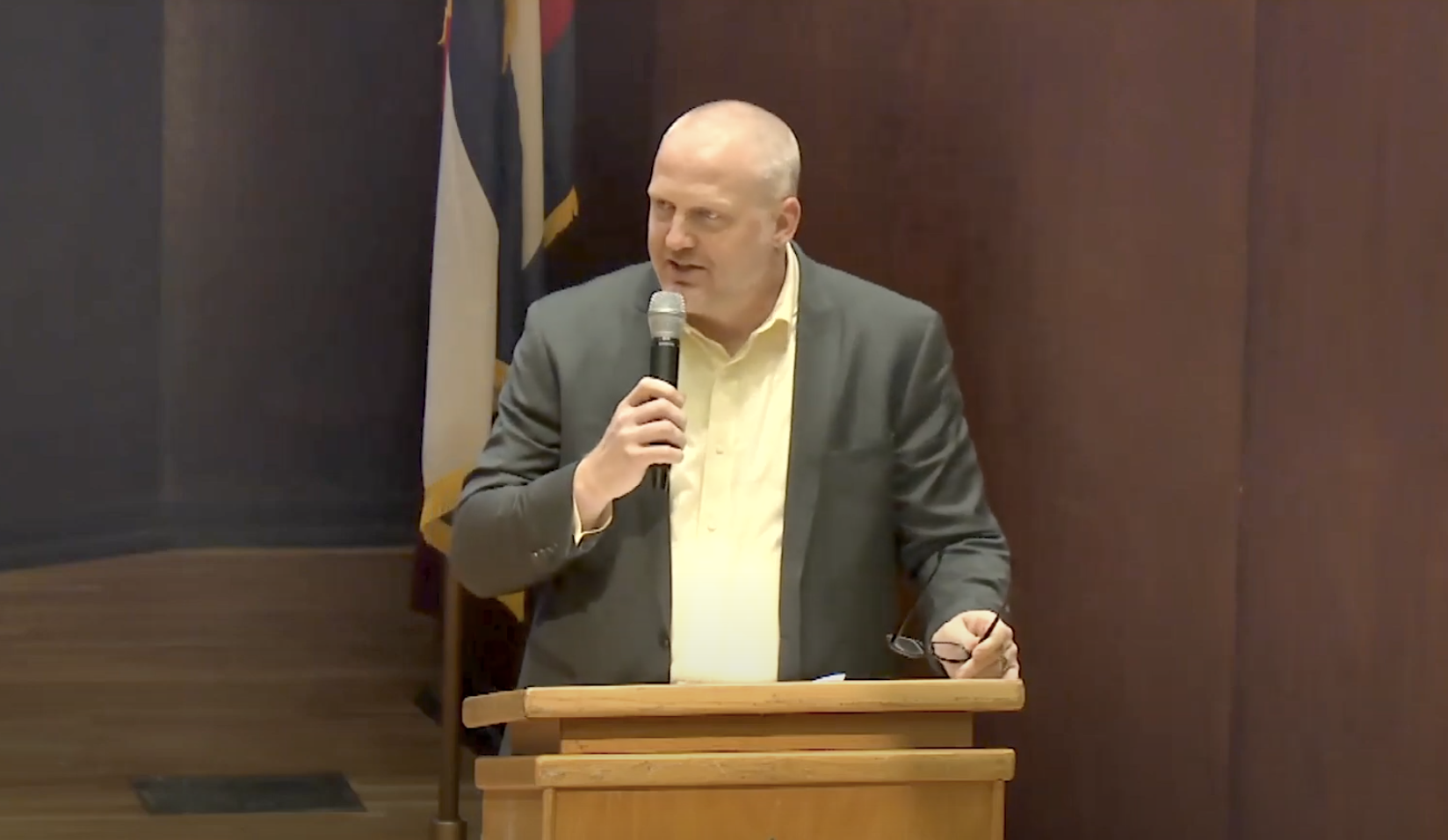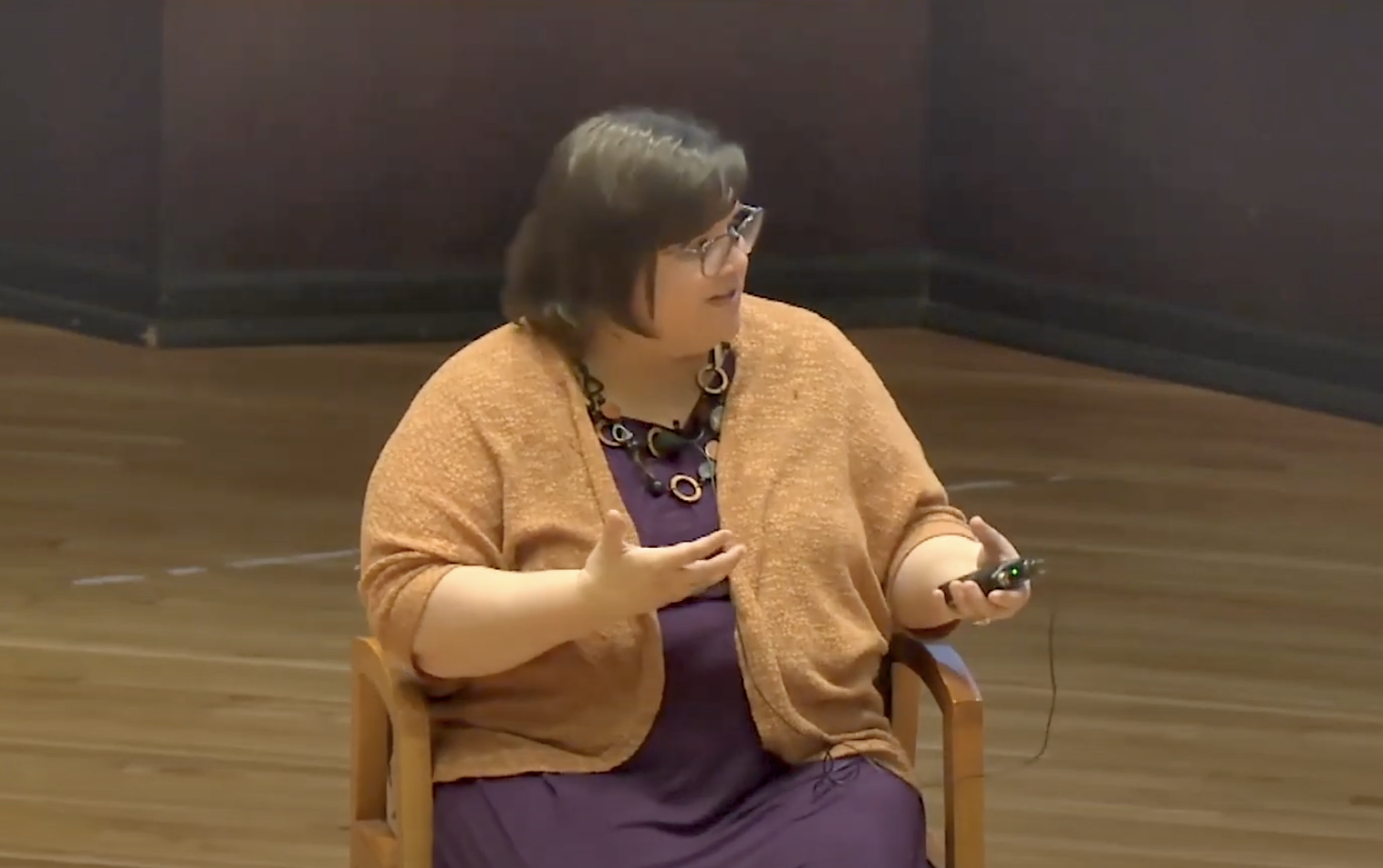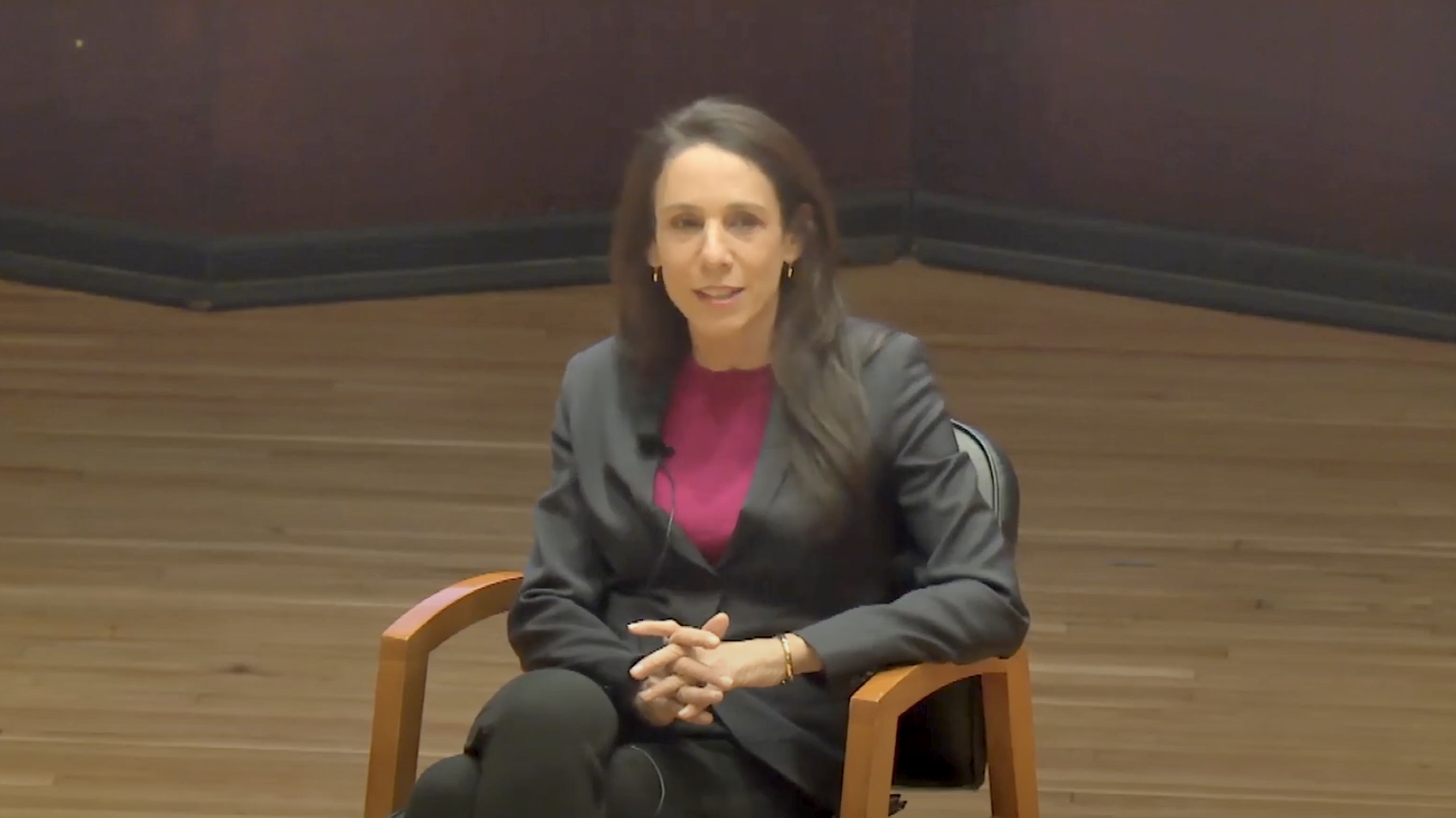By Minyi Jiang
Although Christian nationalism is slowly gaining support among Republicans and older Americans, last month’s election results were not as bad as some people expected for Democrats, UC Santa Barbara alum and Skidmore College associate professor Brad Onishi says.
“The results were not as perhaps bad as we thought,” Onishi said at an event co-sponsored by UCSB’s Walter H. Capps Center. “It was mixed results with razor-thin margins.”
UCSB alum and Skidmore College associate professor Brad Onishi giving an opening speech at the recent SWAJ event in Denver, co-sponsored by UC Santa Barbara’s Walter H. Capps Center.
Onishi was speaking at a Straight White American Jesus (SWAJ) panel discussion in Denver named for a podcast he co-hosts on religion and politics that is a partnership with Capps Center for the Study of Ethics, Religion and Public Life. The discussion featured a group of journalists and scholars who addressed what white American Christian nationalism is and whether this ideology will impact the future of American democracy. About 200 people attended the event in person and another 300 tuned in online.
Christian nationalism defines a consistently narrow profile of who the “real Americans” within this social identity are, said Dan Miller, an associate professor at Landmark College who co-hosts the SWAJ podcast with Onishi.
“They are cisgender, they are heterosexual, they are Protestant, they are English-speaking, they are U.S.-born, they are of Northern European descent, they are affirmative of patriarchy, if not male themselves,” he said. “And it is worth adding, they are politically and socially conservative.” Miller said Christian nationalists don’t necessarily believe people of color or immigrants shouldn't be here, “but that they need to know their place within the social and political hierarchies and expect to be disciplined by way of law or violence, if they disrupt the American way of life.”
Panelists at the recent SWAJ event in Denver, co-sponsored by UC Santa Barbara’s Walter H. Capps Center from left to right: Brad Onishi, Sara Moslener, Annika Brockschmidt (moderator), Katherine Stewart, Robert Jones.
Sara Moslener, a lecturer in religion at Central Michigan University, said that the concepts of “innocence” and “purity culture” are often found in white Christian nationalism, rooted in colonial history when whiteness was associated with freedom and innocence.
“The innocence that is connected to white racial identity has been a … delusion that has worked really well in giving white people a sense of specialness, a sense of ‘we have something in common with one another’,” she said. “There is this sense that we are innocent of all of these things, and white Christian nationalism says: well, this was all part of God's plan.”
Nonetheless, Christian nationalism is more than religious and racial identities — it’s a political ideology, the panelists said.
Christian nationalism is not the “whole of Christianity,” said Katherine Stewart, an investigative journalist and author of The Power Worshippers: Inside the Dangerous Rise of Religious Nationalism. “It’s not a single religion, it’s both an ideology – a set of ideas — and it’s also a political movement – an organized quest for power.”
What makes this Christian nationalist ideology powerful in American politics, she said, is its success in using its organizational infrastructure to mobilize its constituency as a way to turn out votes.
“Many politicians have tried to ally themselves with this ideology to promote it,” Stewart said, citing Ron DeSantis, the governor of Florida, who identified himself with this ideology to gain votes in his political campaign .
“Ideology is really the most effective tool for a political machine that turns the deep story of America's supposedly conservative Christian founding into political power,” Stewart said. She named various groups and networks that have served to target specific groups of voters, especially voters of faith in “conservative-leaning congregations” who share an ethnicity.



Stewart recalled attending at a 2021 conference held by the conservative political advocacy group Faith and Freedom Coalition where its founder, Ralph Reed, recited Christian text from the New Testament to unite voters. She noticed an “increasing militarization of the rhetoric, the demonization of people with political differences.”
“[Ralph Reed] has also collaborated with Christian nationalist and Republican leaders on gerrymandering in the State of Florida which have given Republicans disproportionate advantage in those districts,” she said.
The movement draws in representatives of Protestant and non-partisan traditions, and even draws support from people who do not identify as Christian at all, Stewart said, pointing to wealthy businessmen Barre Seid and Peter Thiel who have been funding conservative causes.
“A lot of the funders frankly are more interested in the far-right economic component of the movement,” she said. “They're much less interested in the culture wars than they are interested in pursuing a far-right economic agenda that includes low taxes or no taxes for the super-rich, minimal regulation of business, minimal regulation for the environment, [and] minimal rights for the workforce.”
She said Christian nationalist political preachers like David Barton, “a key mythmaker” in the movement, talk about Biblical economics and seek theological justification in hard right economics. “They are saying that it’s all about defense of the American family,” Stewart said. “But they're driving support for politicians who are promoting these hard-right economic policies that are leading to a further intensification of economic inequality in our country.”
“This is not just about the culture wars,” she said.
Purity culture is an evangelical Christian culture that is against abortion rights and stresses traditional gender roles and strict abstinence before marriage for women, said Central Michigan University’s Sara Moslener. It defines the role of white womanhood within white Christian nationalism and she said the rhetoric around “purity culture” is mainly about “evangelicals gaining political power.”
“White Christian Nationalism is steeped in myths of national innocence and this idea that the founding of the United States was a God-anointed beginning,” Moslener said. She sees what brings the movement together as a shared commitment to a particular social order, a shared theology of family, a shared understanding of gender roles, sexuality, and more.
“In these conservative communities, women get authority through motherhood,” Moslener said. White religious woman became famous for saying on Twitter that white people need to have more white babies, she said, which supported the Great Replacement conspiracy theory —in which French writer Renaud Camus asserted that European whites were being replaced by Muslims and people of color, aided by a liberal global elite.
Brad Onishi said purity culture within Christian nationalism tries to regulate sex and family to create a nation that is pure in its imagined race, sexuality, ethnicity, language, and religion. In an apparent explanation of former Donald Trump’s popularity, Onishi said “a great American white Christian Protector” is supposed to allay anxieties by protecting our borders and boundaries, but might have to be impure “because that's the only way we're going to maintain these bodies, these families, and this nation.”
The midterms posed a threat to American democracy because white Christian nationalist rhetoric “remains an incredibly potent force in American politics,” Onishi said.
Minyi Jiang is a fourth-year student at UC Santa Barbara, majoring in Middle East Studies and pursuing a minor in Professional Writing. She is a Web and Social Media Intern for the Division of Humanities and Fine Arts.




